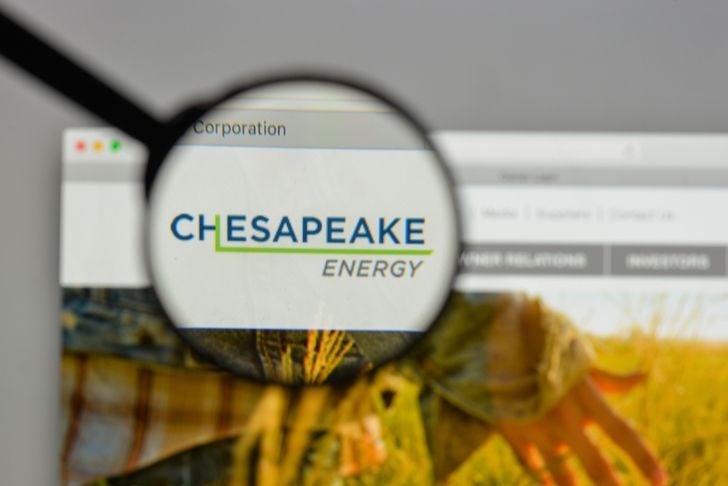Chesapeake Energy (NYSE:CHK) is slated to report its third-quarter earnings before the bell on Oct. 31. The Oklahoma City-based upstream energy company and, to a lesser extent, CHK stock, continue to recover slowly from the oil price slump that nearly destroyed it a few years ago. Investors probably believe that the company’s profit increased last quarter. However, assuming the company’s results do not miss estimates, upgrades to Chesapeake Energy’s balance sheet will likely become the defining factor of this earnings report for CHK stock.
Higher Prices Should Raise CHK’s Profits
Consensus estimates for Q3 earnings per share stand at 15 cents. If the company’s EPS does come in at 15 cents, its profits will have risen 25%, compared with the same quarter a year earlier. Meanwhile, analysts on average expect the company’s Q3 revenue to come in at $2.35 billion, up from $1.94 billion in the same quarter last year.
Judging by recent energy price trends, there are reasons to be upbeat about Chesapeake Energy’s Q3 results. Both oil and natural gas prices have improved since the third quarter of 2017. Oil climbed slowly, but steadily higher in Q3. At the end of the quarter, oil had surged to a four-year high. The average oil price last quarter was around $58 per barrel, up from $52 per barrel in the same quarter of 2017.
CHK is the second-largest U.S. producer of natural gas, as it extracts more natural gas than all American companies except Exxon Mobil (NYSE:XOM). Chesapeake Energy outproduces more stable companies such as Anadarko Petroleum (NYSE:APC) and
Devon Energy (NYSE:DVN). Consequently, the recent surge in natural gas prices will boost Chesapeake’s profits.
Natural gas prices had been rangebound for most of the year. However, weather experts predict that the upcoming winter will be exceptionally cold. For this reason, late in September, gas prices began to shoot above the key $3 per 1,000 BTU level and have remained above that point. It’s still unclear how much of the price increase will be reflected in Chesapeake’s third-quarter results.
Meanwhile, CHK has beaten consensus earnings estimates in three of the four quarters from the third quarter of 2017 through Q2 of this year. In the second quarter of 2018, the company met the consensus EPS estimate of 15 cents. Assuming the company’s Q3 results at least meet estimates, CHK stock probably won’t be affected a great deal by the company’s top-line and bottom-line numbers.
Debt Continues to Weigh on CHK Stock
Chesapeake Energy’s high debt levels continue to weight on CHK stock. Massive borrowing fueled CHK stock during the previous energy boom. Unfortunately, when that boom ended, energy prices declined, and Chesapeake Energy ‘s debt became unsustainable.
Investors’ fears of the company going bankrupt in the near-term have subsided. But CHK, with a market cap of $3.5 billion, had over $9.2 billion in long-term debt as of the end of Q2. The company continues to sell assets to reduce that debt, although it has only lowered its debt to a limited extent. Debt likely remains the reason that CHK stock trades at such low levels. As a result, investors will probably be interested in any news regarding reduction of the company’s debt.
Still, for those investors with a high level of risk tolerance, I think CHK stock presents an opportunity. Given the likely cold winter and the geopolitical tensions in the Middle East, natural gas prices and oil prices should continue to move higher.
Moreover, increases in profits and reduction in debt will mitigate the balance sheet issues that are probably weighing on CHK stock. For investors who can exercise patience and tolerate some risk, I think buying CHK stock makes some sense, as the shares can yield massive gains over the long-term.
The Bottom Line on CHK Stock
Increases in oil and natural gas prices should enable Chesapeake Energy to meet or exceed analysts’ consensus earnings estimates.
However, the company’s high debt levels continue to weigh on CHK stock, as its debt currently stands at more than 2.5 times its market cap. Admittedly, CHK will not be able to stabilize its balance sheet unless oil and natural gas prices continue to rise.
Still, such increases appear on track to occur. I believe that patient, risk-tolerant investors will be rewarded by CHK stock over the long-term. The company’s upcoming earnings reports will probably help to convince more investors to adopt a similar view of the company’s outlook.
As of this writing, Will Healy did not hold a position in any of the aforementioned stocks. You can follow Will on Twitter at @HealyWriting.

